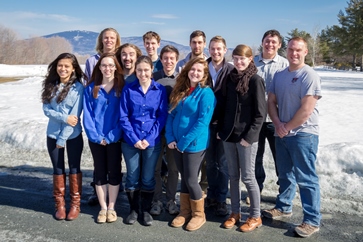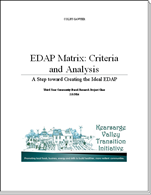
Energy Descent Action Plan for the Kearsarge Valley Transition Initiative
The 2013-2014 Community Based Research Project Team collaborated with community members, businesses, and local organizations to strengthen the infrastructure of the Kearsarge Valley Transition Initiative (KVTI), which was established as the 139th Transition Initiative in the United States by the 2012-2013 team. To address the goals of a Transition Town Initiative, the group focused on establishing three working groups involving both community members and students in order to promote ideas of sustainability, strengthen the community, and raise involvement in the KVTI. In addition, they authored an Energy Descent Action Plan (EDAP), which will serve as a road map for the community to foster a more ecologically sustainable, economically independent, and energy resilient future. The group was able to inspire change within the surrounding community while also seeking solutions for our energy intensive lifestyles through research into the key sectors that create a healthy, prosperous community.
The three working groups that provided the basis for community involvement in this initiative were Eat Your Yard!, the Kearsarge Time Bank, and the GRAZE Conversation Café. The Eat Your Yard! working group promoted the conversion of lawns and public spaces into edible landscapes, thereby promoting the idea of eating locally and reducing our community's dependence on economically and environmentally unsustainable practices. The Kearsarge Time Bank was established as a means to strengthen community bonds and interaction through the sharing or trading of skills and services. Finally, the GRAZE Conversation Café was used as a meeting place for inspiring discussion on topics related to sustainable practices, relocalization, and community building. Through these working groups and events, the 2013-2014 Community Based Research Project Team was better able promote the KVTI and its principles. Progress reports and manuals for each group are now available.
The creation of the EDAP draft was accomplished through extensive research on the key sectors of our local community, including residential, local economy, agriculture, health, waste, education, transportation, and energy. The goal of this working document was to analyze the current conditions of each of these sectors within the nine towns and formulate methods to reduce our dependence on non-renewable energy sources, so that the region will be more resilient to outside economic and environmental shocks in the future. Within this document are results from a survey that gauged the community's opinion on many topics vital to the initiative, as well as a broad array of "Steps to Resilience" for each of the sectors outlined above. It is our hope that the community will treat the EDAP as a working document and introduce their own goals so it reflects their collective vision for the future. For more information on the working groups or to review the current version of the EDAP, please contact Leon-C. Malan or Jennifer White.
The group is very thankful for the cooperation of the Colby-Sawyer community and all of the local residents, businesses and organizations that supported its efforts. They are also grateful for the guidance and support provided by their professors: Leon-C. Malan, Harvey Pine, and Jennifer White.
Members of this class were: Morgan Allen, Pooja Byanjankar, Kenneth Camacho, Nick Capalbo, Steve D'Angeli, Garrett Dunnells, Douglas Foley, Teddy Hoople, Libby Humpal, Olin Jenner, Nathan Larrimer, Hannah Raddatz, and Nykki Stritzinger.



